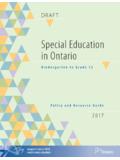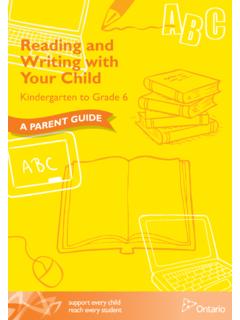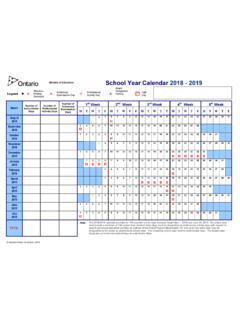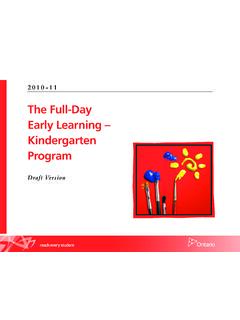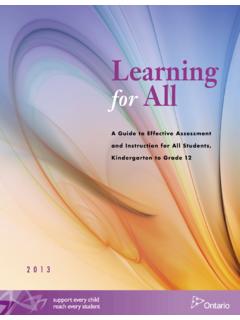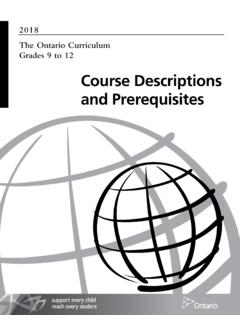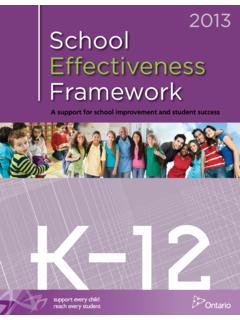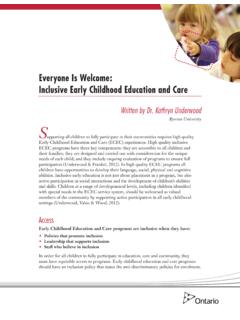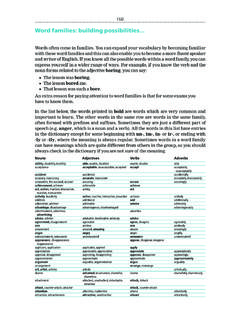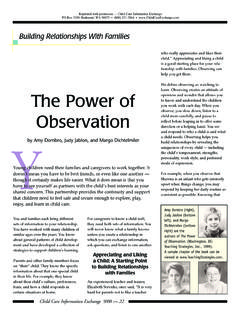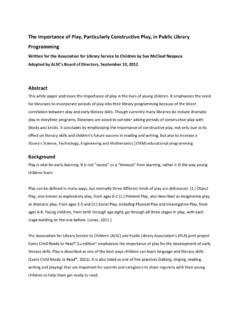Transcription of Capacity Building Series - Ontario
1 CapacityBuildingSeries SECRETARIAT SPECIAL EDITION #29A Call to Action .. When parents are engaged and involved, everyone benefits, and our schools become increasingly rich and positive places to teach, learn and grow. (Supporting the Ontario Leadership Strategy, 2012, p. 1)Please note that in this monograph, the word parent is used broadly to refer not just to parents but to guardians, caregivers and other family members who help children learn both at home and 2012 ISSN: 1913 8482 (Print)ISSN: 1913 8490 (Online)The Capacity Building Series is produced by the Student Achievement Division to support leadership and instructional effectiveness in Ontario schools. The Series is posted at: For information: EngagementWorking with families /Supporting Student Learning Schools that successfully engage parents are inclusive they reach out to parents who may not feel included in the life of the school and to families whose children may be experiencing challenges with the curriculum.
2 They work at Building positive relationships and a welcoming school climate and at providing parents with practical strategies to build a stronger educational culture in their homes. Such authentic family-school partnerships are focused on improving attitudes to school and enhancing students future success; they are engaged in what Ken Leithwood calls co-producing learning (Webcasts for Educators, 2012) Engaging parents in the life of the school yields many positive benefits and rewards for families and schools alike; leveraging home-school partnerships so that parents are encouraged and supported to be involved in their children s learning at home and school is the focus of this monograph. Shifting the Focus There are many ways parents make a difference in their children s success at school. Parents who talk with their children about their day at school or who make sure there is a quiet place to do homework or who serve on school councils or who volunteer on school trips are all examples of engaged parents.
3 Parent involvement that is focused on student learning has the greatest impact on student achievement. Ken Leithwood, in fact, has suggested we need to think about shifting our focus from how to get more parents into the school to how we can support them at home, where he says, half of the achievement we re responsible for as educators happens (Webcasts for Educators, 2012). 2 Other researchers support this re-orientation, urging educators to become even more attuned to the values and the culture of the home and to find ways to engage parents in their children s learning in ways that are meaningful for them (Henderson & Mapp, 2002). In shifting the focus from getting more parents into the school to working collabora-tively with them to support their children s learning and well-being, it is more important than ever before to become familiar with one another s worlds : How can we effectively open doors to each other s world so that we foster close and common understanding?
4 What role might both students and parents play? How might we interact and co-learn with families ? How can we build from a position of asset and acceptance? In what ways can we build on the strengths, interests and talents of students and their families ?A Professional InquirySchool teams who are making plans to strengthen their learning partnerships with parents may wish to engage in a professional inquiry based on such reflective questions as: Are we sensitive to the differentiated characteristics of the students and families we serve? Do we demonstrate a flexible outreach mindset? Are we developing an awareness of our own potential biases, stereotypes and assumptions that may impact or even serve as a barrier to parent engagement? Are we patient and persistent enough to make meaningful connections one family at a time? Are we looking at ways to connect with parents who face barriers to traditional approaches to parent engagement? It s all about student learning.
5 Schools have an important role in helping parents learn the language of schooling so that the parents can provide every possible assistance to their children in terms of developing the child s learning and love of learning, and in creating the highest possible shared expectations for learning. (Hattie, 2009, p. 33)Opening the Door From formal meet the teacher nights to telephone conversations and interviews to school-sponsored family barbeques, fun fairs and informal schoolyard chats, educators have many occasions to engage directly with parents and gain a more fulsome under-standing of their worlds. Many administrators use online and/or print surveys to find out what parents may be interested in strategies for reading with children or helping with homework, time-management skills or communicating with teens. Surveys may also be used at the classroom level to gauge parent interest in such topics as literacy, problem-based mathematics instruction, integrated learning and so on.
6 (Some sample parent engagement surveys can be found at Parent_ )One way for parents to connect to the school is through the involvement of their children. If students are performing, presenting or competing at the school, family members will often be in attendance. It has been the experience of many educators that drama productions, musicals, concerts and sports events generate family audiences. In a recent study of schools in challenging circumstances, one teacher commented: We had a Literacy Night last year that bombed because it smacked of we re going to teach you how to be better parents . And that just makes them back away .. basically what we thought [this year] is that we d have the kids perform .. (Flessa, 2010, )3 Innovative strategies such as Living Museum, where students share artefacts attached to significant family stories also serve to connect the school with families and can be the beginning of Building strong relationships. Working with community organizations further enhances school and classroom efforts to support parent interests and student needs.
7 Public libraries, health units, service groups, the YMCA and so on offer programs ranging from local literacy/author events and home reading packages to clubs and sports programs. In helping parents access these programs, schools not only deepen their connections with the families in their community, but they also contribute to Building a multi-pronged, whole-community approach to student success. Through conversation and feedback from parents and students, educators develop a growing awareness and understanding of the diverse cultures and communities in their schools. They begin to explore what researchers describe as the nature of relationships and shared meanings and practices within the school between teachers, between staff and students, between teachers and school leaders and beyond the school, into children s families and communities (Epstein & Sanders, 2010; Flessa, 2010; Fullan, 2007; Leithwood, Louis, Anderson, & Wahlstrom, 2004).Maintaining ongoing communication.
8 Direct communication, seeking information from parents about what they want and need for their child s success, helps build strong school-family connections. A shared understanding about what the child will learn this year and how their learning will be assessed helps parents support their children and helps maintain communication all year. (Patel, Corter & Pelletier, 2008)Leading with Our EarsSacramento educator Larry Ferlazzo uses the metaphor of leading with our ears to emphasize the importance of listening to our parent communities. He writes that a school beginning to involve parents, often leads with its mouth, identifying projects, needs and goals and then telling parents how they can contribute. A school striving for parent engagement, on the other hand, tends to lead with its ears listening to what parents think, dream and worry about. The goal of family engagement is .. to gain partners (2011, p. 8).Every parent has hopes and dreams for their child.
9 And, in turn, children and adolescents harbour their own evolving dreams and goals, big and small. What are their imagined futures? By engaging with parents and students in conversations that illuminate relevant family narratives, educators show they appreciate those things that define who the student is, not only as a learner but also as a person. Listening to both parent and child, we come to know what is important and valued and to develop shared high expectations. So we need to ask:What do you think I should know about your child? As a person? As a learner? What are your hopes for your child this year? And beyond this year?The knowledge gained through listening to parents in the many ways they express themselves serves to frame not only possible discussion points with students, but also entry points for further conversations with parents; what is learned provides insights and information that ultimately enables teachers to provide better support for students.
10 When families are able to share that knowledge, as well as their understanding of their child .. they will be more supportive of their child s learning (Charles Pascal, cited in The Full-Day Early Kindergarten Program, 2010 2011, p. 9). Open, reflective and empathetic listening is essential to Building relationships with parents. At the same time, we need to listen reflectively, to hear and question our own voice. We need to be aware of, and recognize, how we are positioned in the conversation, how we listen, what we say or don t say, and what we choose to do or not do. This all holds the potential to influence perceptions, attitudes and ultimately our relationships with families to build the foundations for an authentic partnership on behalf of student to ask questions ..There may be value in sharing with parents the types of questions and prompts that are used by educators in the classroom to deepen student thinking. Reflective questions, such as those written for work or assignments that go home, may be one way to model leading with our ears and to encourage an open-to-learning stance all round: Tell me more What did you What are you wondering How can you find out Tell me about the learning you think has been the most important for What moves you forward in your learning/helps you to learn?
